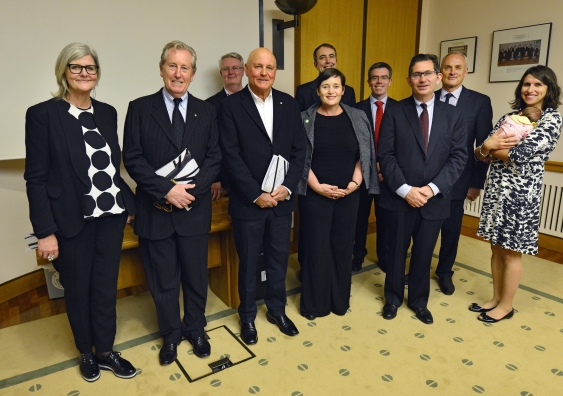Blueprint to power
UNSW has joined a coalition of prominent Australians to ensure the country's transition to a clean energy future.
UNSW has joined a coalition of prominent Australians to ensure the country's transition to a clean energy future.

An unlikely coalition of 17 prominent leaders, chaired by UNSW, has presented the federal government with a blueprint to drive a national transition to clean energy.
The blueprint was drafted by the Energy Transition Leadership Forum, chaired by UNSW President and Vice-Chancellor Professor Ian Jacobs and made up of 17 leaders from key sectors. “A planned transition to clean energy will bring healthier lives and economic certainty,” the blueprint states. “It will unleash billions in investment and create jobs. Without leadership, the transition will still happen, but it will be chaotic and unfair, with jobs lost and energy disrupted.”
Climate change is one of the biggest challenges facing humanity and I believe the Forum blueprint provides an opportunity to make a difference.
Late last year, inspired by UNSW’s Grand Challenge on Climate Change, the President of the Australian Conservation Foundation, Geoff Cousins, and Professor Jacobs assembled the unusual coalition of CEOs of energy companies, scientists, academics, economists, bankers, lawyers, conservationists, a broadcaster and a former Governor-General of Australia.
The non-partisan group calls for a national plan to establish rules, policies, regulations, markets and a basis for investment to power the transition. Its blueprint outlines eight actions needed to drive a clean energy transition.
"Transitioning to clean energy will be a complex process that needs to involve all key parties,” Professor Jacobs said. "Climate change is one of the biggest challenges facing humanity and I believe the Forum blueprint provides an opportunity to make a difference and to move Australia forward to becoming carbon neutral as quickly as possible.”
OUR ENERGY FUTURE
A plan to transition Australia to clean energy
■ Update the electricity market to speed up a clean energy transition
■ Facilitate and accelerate the inevitable closure of coal-fired power plants
■ Accelerate the uptake of clean energy and support the development of new technology
■ Create an attractive sustainable investment environment for clean energy
■ Ensure a just transition for communities and workers
■ Protect vulnerable Australians
■ Make Australia’s buildings and businesses much more efficient users of energy
■ Dramatically reduce transport emissions
Read the full blueprint at www.acf.org.au
In tandem with its prominent role in the Leadership Forum, UNSW has implemented a new investment strategy to become a leader in adopting environmental, social and governance principles in its investment activities.
A new investment policy establishes a climate change strategy for investments, reflecting the global community’s commitments made under the Paris Agreement and UNSW's world-leading research to find solutions to climate change and a just transition to a carbon neutral future.
Professor Jacobs said the new policy “puts responsible investment principles first” and reflects the need for a fair and orderly transition to clean energy.
“We envisage a gradual transition in our investment portfolio. This will inevitably involve greater investment in renewable energy production and less in fossil fuels over time,” Professor Jacobs said.
“We see this as a planned and responsible transition in our investments, distinct from the usual use of the term ‘fossil fuel divestment’, which implies an immediate end to direct investment in fossil fuel-producing entities.”
In an introductory essay to the Forum blueprint, Pulitzer Prize-winning author Geraldine Brooks observes that humanity is facing its greatest threat, and its greatest opportunity: “This is not a matter of 'we should do this’ or ‘we’d be wise to.’ It’s simpler. We must. And we can." The energy challenge facing Australia, she writes, is clear: “Change will come. Australia’s choice is to embrace the transition and the economic opportunities it brings. Or we can resist and delay and deal with consequences of an unmanaged and chaotic transition that harms our communities and our economy and fails to rapidly lower our climate pollution."